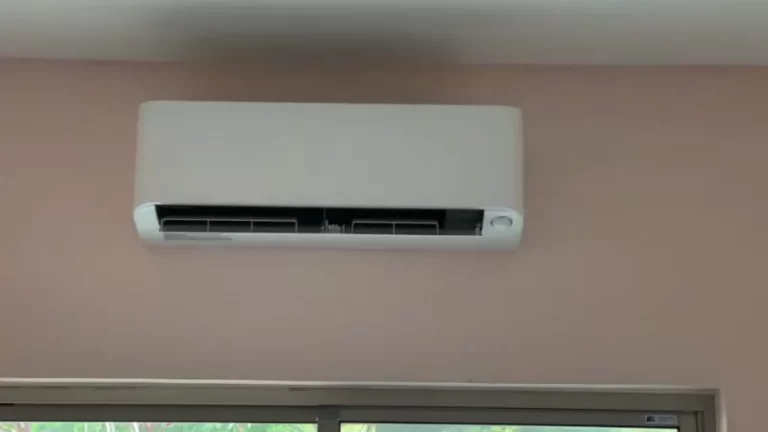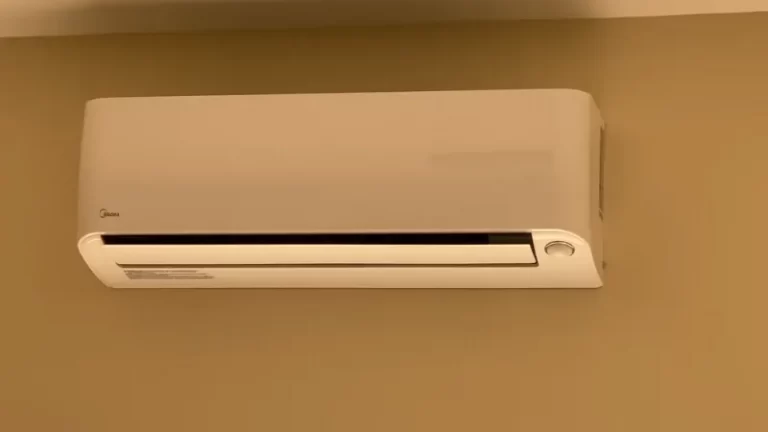Is Water Leaking From Air Conditioners Dangerous? How to Solve?
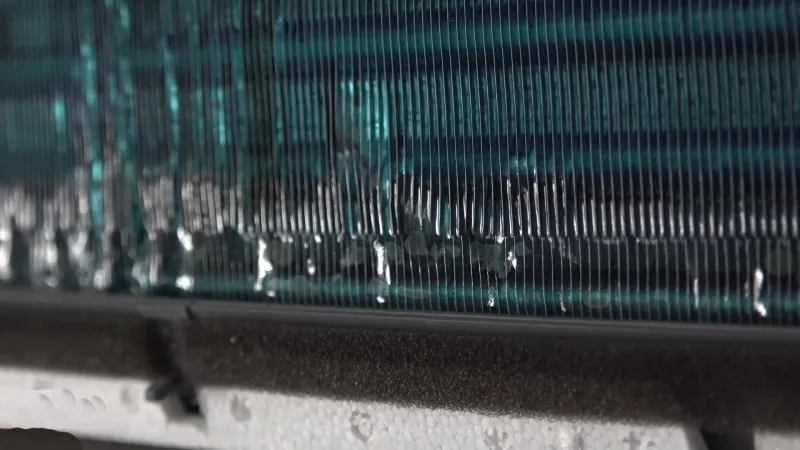
Air conditioners are essential appliances that help keep homes and businesses comfortable during hot and humid weather. However, when an air conditioner begins to leak water, it can cause a host of issues and pose various risks and dangers to homeowners.
Water leakage can be caused by a variety of factors, such as clogged drain lines, dirty air filters, and low refrigerant levels. In this article, we will explore the dangers of water leaking from an air conditioner, the potential risks it poses to personal health and safety, and how to deal with the issue to prevent further damage.
By understanding the importance of regular maintenance and prompt attention to water leakage issues, homeowners can keep their homes safe and comfortable throughout the year.
You'll Learn About
Causes of Water Leaking From an Air Conditioner
Here are 10 common causes of water leaking from an air conditioner, along with a brief explanation of each:
Clogged Drain Lines
Over time, the drain lines that remove condensation from the air conditioner can become clogged with dirt, dust, and debris, causing the water to back up and overflow.
Dirty Air Filters
If the air filters become clogged with dirt and dust, it can restrict the airflow over the evaporator coils, causing them to freeze over. When they eventually thaw, excess water may leak from the unit.
Low Refrigerant Levels
If the refrigerant levels are too low, the evaporator coils may not be able to absorb enough heat from the air, causing them to freeze over and leading to water leakage.
Damaged Drain Pan
The drain pan is designed to catch any condensation that forms on the coils, but if it becomes damaged or cracked, water may leak out.
Improper Installation
If the air conditioner is not installed properly, it may be tilted or misaligned, causing water to accumulate and leak from the unit.
Dirty Coils
If the evaporator coils become coated in dirt and dust, it can impede their ability to absorb heat, causing them to freeze and leading to water leakage.
Oversized Unit
If the air conditioner is too large for the space it is cooling, it may cycle on and off too frequently, leading to excess condensation and water leakage.
Blocked or Closed Vents
If the air vents in the home are blocked or closed, it can restrict the airflow through the air conditioner, causing the coils to freeze over and leading to water leakage.
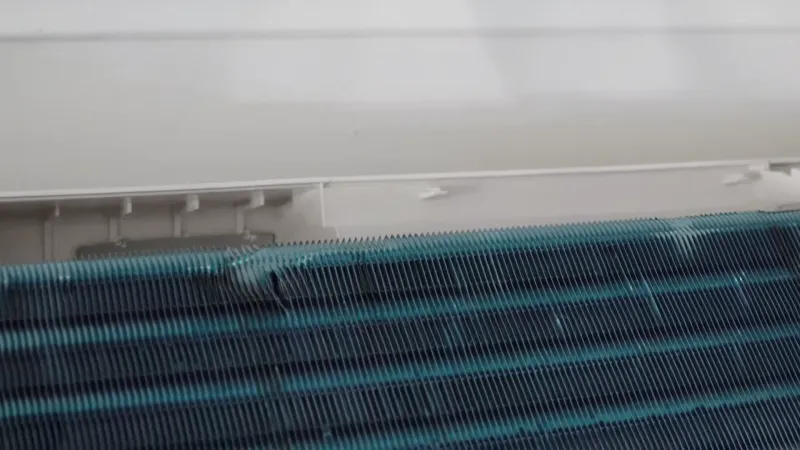
Humidity
In areas with high humidity, air conditioners may produce more condensation than usual, leading to excess water that may leak from the unit.
Age and Wear and Tear
Over time, air conditioners may simply wear out or become less efficient, leading to increased condensation and the potential for water leakage.
Regular maintenance is important to prevent these and other causes of water leakage from an air conditioner. By addressing potential issues early on, homeowners can avoid potential damage and health risks, and keep their units functioning properly for years to come.
Dangers of Water Leaking From an Air Conditioner
Here are 10 potential dangers of water leaking from an air conditioner, along with a brief explanation of each:
Structural Damage
If the water from the air conditioner leak is left unchecked, it can seep into walls, floors, and ceilings, causing damage to the home’s structure.
Electrical Damage
Water leaking from an air conditioner can damage electrical systems and potentially cause electrical shocks or fires.
Mold Growth
Excess moisture from water leakage can create the perfect conditions for mold growth, which can cause respiratory problems, allergies, and other health issues.
Bacterial Contamination
Standing water can also breed bacteria, leading to potential health risks for anyone in the home.
Odor
Stagnant water can create a musty odor that can permeate the home and be difficult to remove.
Damage to Personal Property
If water leaks onto personal property, it can cause damage or ruin belongings.
Slip and Fall Accidents
Water on floors can create a slip and fall hazard, potentially causing injury.
Pest Infestations
Standing water can attract pests such as mosquitoes, flies, and other insects.
Increased Utility Bills
If the air conditioner is leaking water, it may be working less efficiently, leading to higher utility bills.
Decreased Air Quality
Mold and bacteria growth from water leakage can decrease the air quality in the home, leading to potential health issues.
Addressing water leakage from an air conditioner promptly is important to prevent these and other potential dangers. By seeking professional assistance and addressing the issue quickly, homeowners can minimize the risks associated with water leakage and keep their homes safe and healthy.
Step-by-step Guide on How to Deal With Water Leaking From an Air Conditioner
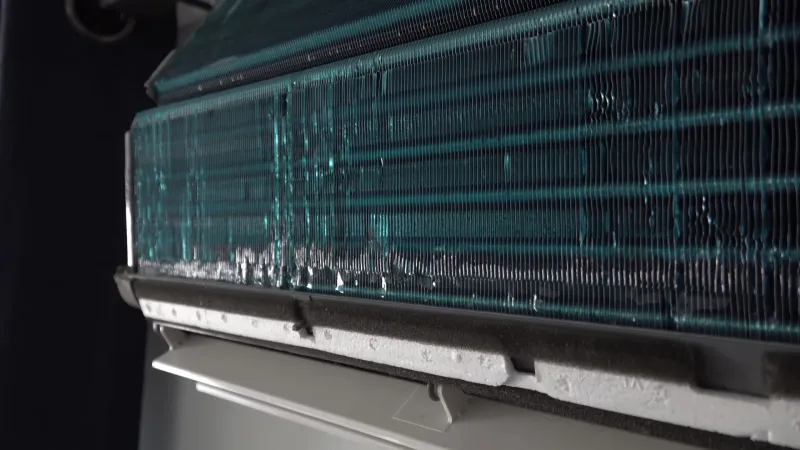
Tools needed:
- Bucket or container
- Towels or rags
Turn Off the Air Conditioner
As soon as you notice water leaking from the air conditioner, turn off the unit to prevent further damage and potential safety hazards.
Place a Bucket or Container Under the Leak
To prevent water damage to floors or personal property, place a bucket or container under the leak to collect the water.
Soak Up Any Standing Water
Use towels or rags to soak up any standing water around the air conditioner, being careful not to spread the water to other areas.
Seek Professional Assistance
It’s important to call a licensed HVAC technician to diagnose and repair the issue, as they have the expertise and tools necessary to safely and effectively address the problem.
Allow the Area to Dry
After the technician has repaired the issue, allow the area around the air conditioner to dry completely before turning the unit back on.
Tips for Preventing Water Leakage in the Future
Regular Maintenance
Schedule annual maintenance for the air conditioner to ensure that it is functioning properly and to catch any potential issues early on.
Change Air Filters
Change air filters regularly to prevent them from becoming clogged with dirt and dust, which can impede airflow and cause the evaporator coils to freeze over.
Keep the Area Around the Unit Clear
Ensure that the area around the air conditioner is clear of any debris or obstructions, as these can interfere with the unit’s function.
Monitor Humidity Levels
In areas with high humidity, monitor humidity levels and consider using a dehumidifier to reduce excess moisture in the air.
By following these tips and seeking professional assistance when necessary, homeowners can prevent water leakage from their air conditioners and keep their units functioning properly for years to come.
Is It Safe to Use Ac When Water is Leaking?
Using an air conditioner when it is leaking water can pose various risks and dangers. It is important to address the issue promptly to prevent further damage and potential safety hazards.
First and foremost, if an air conditioner is leaking water, it is a sign that there is a problem with the unit. Water leakage can be caused by a variety of issues such as clogged drain lines, dirty air filters, low refrigerant levels, or even a faulty unit. Using the air conditioner when it is leaking water can exacerbate the problem, leading to further damage to the unit, personal property, and the home’s structure.
Water leakage from an air conditioner can also pose potential electrical hazards. The water can seep into electrical systems and create a risk of electrical shocks or fires. This can lead to potential harm to anyone in the home and can cause significant damage to the property.
Furthermore, water leakage can create a breeding ground for mold and bacteria growth. This can lead to potential health risks for anyone in the home, particularly those with respiratory problems or weakened immune systems. Mold can also cause damage to personal property and create a musty odor that can be difficult to remove.
In addition to health risks, water leakage can also create slip and fall hazards. Water on floors can create a slippery surface, potentially causing injury to anyone in the home. This can be particularly dangerous for children, the elderly, and those with mobility issues.
Using an air conditioner when it is leaking water can also lead to increased utility bills. If the air conditioner is not functioning properly, it may be working less efficiently, leading to higher energy consumption and increased utility bills.
In summary, using an air conditioner when it is leaking water is not safe and can pose various risks and dangers. It is important to address the issue promptly by turning off the unit, placing a container to catch the water, and seeking professional assistance to diagnose and repair the problem. By addressing the issue promptly and taking steps to prevent water leakage in the future, homeowners can keep their homes safe and healthy.
How Long Will Ac Last With a Leak?
An air conditioner is a significant investment for homeowners, and it is essential to ensure that it is functioning properly to provide optimal cooling and comfort. When an air conditioner begins to leak, it can lead to various issues and pose risks to personal health and safety. In terms of how long an AC unit will last with a leak, it is typically no more than a few weeks to a few months, depending on the severity of the issue.
Lifespan
The lifespan of an air conditioning unit can vary, depending on several factors such as the type of unit, the age of the unit, the level of maintenance, and the extent of the leak. A central air conditioning unit typically has a lifespan of 10-15 years, while a window unit may last for 5-7 years. However, when an air conditioner is leaking, its lifespan may be significantly reduced.
Damage Shorten the Lifespan
One of the primary issues associated with an air conditioner leak is the damage that it can cause to the unit’s components. Water can seep into electrical systems and cause damage to the compressor, fan, and other vital components. This can lead to a breakdown in the unit’s performance and ultimately result in the need for costly repairs or replacement.
Growth of Mold and Bacteria
In addition to the damage caused to the unit’s components, an air conditioner leak can also lead to the growth of mold and bacteria. This can create a health hazard for homeowners and their families, particularly those with respiratory problems or weakened immune systems. Mold can also cause significant damage to personal property and create a musty odor that can be difficult to remove.
Increased Utility Bills
Furthermore, water leakage can also lead to increased utility bills. If the air conditioner is not functioning correctly, it may be working less efficiently, leading to higher energy consumption and increased utility bills.
Severity of the Leak
The severity of the leak can also affect how long the air conditioner will last. If the leak is small and caught early, it may only require a simple repair, and the unit may continue to function for several more years. However, if the leak is significant and causes damage to critical components, the unit may fail within a few weeks or months.
What to Do?
Regular maintenance is essential to ensure that an air conditioner is functioning correctly and to catch any leaks or issues before they become severe. Homeowners should schedule routine maintenance with a licensed HVAC technician to clean the unit, replace air filters, and check for leaks or other issues. By addressing issues promptly and taking steps to prevent water leakage in the future, homeowners can prolong the life of their air conditioning unit and avoid costly repairs or replacement.
The lifespan of an air conditioning unit with a leak can vary, depending on the severity of the issue and the level of maintenance. In general, an air conditioning unit with a leak may last for no more than a few weeks to a few months.
It is crucial to address any issues promptly and to schedule routine maintenance to keep the unit functioning correctly and prolong its lifespan. By doing so, homeowners can ensure optimal cooling and comfort throughout the year while avoiding costly repairs or replacement.
Final Words
Water leakage from an air conditioner can pose various risks and dangers to homeowners. Using an air conditioner when it is leaking water can exacerbate the problem, leading to further damage to the unit, personal property, and the home’s structure.
It can also create electrical hazards, potential health risks, and slip and fall hazards. It is important to address the issue promptly by turning off the unit, placing a container to catch the water, and seeking professional assistance to diagnose and repair the problem.
By taking steps to prevent water leakage in the future through regular maintenance and keeping the area around the unit clear, homeowners can keep their homes safe and healthy.

